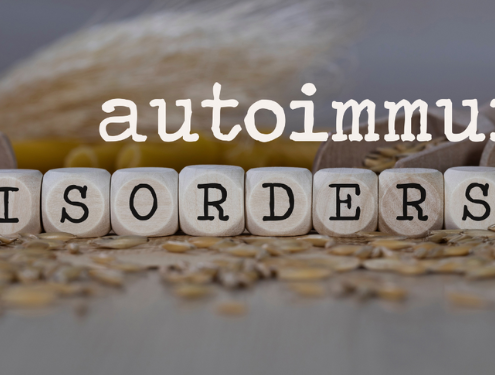How can hypothyroidism be prevented if you have Hashimoto’s?

Photo by Tachina Lee on Unsplash
It’s a common misconception that Hashimoto’s thyroiditis (an autoimmune disease) and hypothyroidism (an endocrine disorder) are the same conditions that occur simultaneously. While it’s true that hypothyroidism and Hashimoto’s are connected in some ways, they’re also very different medical conditions that don’t always present at the same time.
You can very well be diagnosed with one condition but not the other — or have Hashimoto’s autoimmune thyroiditis and never go on to develop hypothyroidism symptoms. It all depends on the specific type and level of Hashimoto’s thyroiditis antibodies in the blood — and how much damage the thyroid gland incurs as a result of autoimmunity (remember, Hashimoto’s disease is an autoimmune process that causes the immune system to mistakenly attack the thyroid gland).
Though it’s also true that Hashimoto’s disease increases the risk of developing hypothyroidism (an underactive thyroid), it’s not a guarantee that you will. Especially if you take steps to lower your thyroid antibodies and to manage your autoimmunity, you can reduce your risk of developing hypothyroidism.
Let’s look at a few of the things you can do to prevent hypothyroidism if you have Hashimoto’s disease or suspect that you might.
First, know who is at risk of hypothyroidism
If you have Hashimoto’s disease (or suspect that you do), your first step to preventing hypothyroidism is to understand your risk. It all starts with testing your thyroid antibodies and understanding the results.
When you have higher-than-normal levels of thyroid antibodies in your blood, this confirms a diagnosis of Hashimoto’s thyroiditis: an autoimmune disease and a leading cause of hypothyroidism. Thyroid peroxidase antibodies (TPOAb) and thyroglobulin antibodies (TgAb) are both used to diagnose Hashimoto’s autoimmune thyroiditis.
However, while thyroid peroxidase antibodies and thyroglobulin antibodies are used to diagnose Hashimoto’s, thyroid peroxidase antibodies are the only antibodies associated with an increased risk of developing hypothyroidism. High levels of thyroglobulin antibodies are not associated with hypothyroidism unless TPOAb levels are elevated as well.
If thyroglobulin levels are high but thyroid peroxidase levels are within the normal range, this elevation could be due to Hashimoto’s thyroiditis, Graves’ disease, or possibly something more serious like thyroid cancer (though unlikely).
Thyroid peroxidase antibodies & hypothyroidism risk
While elevated thyroid peroxidase antibodies are associated with an increased risk of developing hypothyroidism, most people will not become hypothyroid. In fact, only up to 19 percent of patients with elevated thyroid peroxidase antibodies will eventually develop hypothyroid symptoms, according to a study that followed more than 5,000 people over a nine-year period.
What’s more, the specific level of Hashimoto’s thyroiditis antibodies in the blood also affects hypothyroidism risk. For instance, thyroid peroxidase antibody levels above 500 have been associated with a moderately increased risk of developing hypothyroidism (about a 20 to 25 per cent increased risk). The higher the level of thyroid peroxidase antibodies — the greater the risk of developing hypothyroidism in the future.
However, when levels are at or below 500, Hashimoto’s is less likely to cause hypothyroidism. At least not in the near future.
Reducing your hypothyroidism risk
Now that we’ve looked at the primary risk factors for hypothyroidism, let’s talk about some of the other factors that can increase your risk of developing an underactive thyroid. These include:
- Genetics.
- Gut dysbiosis.
- Environmental factors such as diet, lifestyle, nutrient deficiencies, and exposure to pollutants like chemicals and heavy metals.
- Taking certain medications.
- Undergoing thyroid surgery.
- Receiving radiotherapy to the head, neck, or thyroid gland.
Although it isn’t possible to avoid these risk factors altogether — or prevent hypothyroidism entirely — you can greatly reduce your risk of developing hypothyroidism symptoms in the future by taking steps to lower your thyroid antibodies.
Modifying your diet and lifestyle, improving your gut health, balancing your hormones, supplementing with selenium and myo-inositol, and addressing other potential nutrient deficiencies associated with thyroid health (such as vitamin D, iron, and occasionally, iodine) can all help to lower Hashimoto’s thyroiditis antibodies and reduce your risk of developing hypothyroidism symptoms!
As a registered Nutritional Therapy Practitioner and an Autoimmune Paleo Certified Coach, my approach includes dietary and lifestyle modifications. Depending on your specific situation, I may recommend following the Autoimmune Paleo (AIP) diet for a short period of time — or a less restrictive version known as Modified AIP. I may also recommend functional nutritional testing to look for nutrient deficiencies that can further increase your risk of developing hypothyroidism.
Work with a thyroid nutritionist
Do you have hypothyroidism, Hashimoto’s disease, or another autoimmune disease or chronic health condition? Nutritional therapy can help you improve your symptoms and quality of life. Book a free 20-minute inquiry call to get started!
References:
- https://drruscio.com/what-is-hashimotos/
- https://www.mdpi.com/1422-0067/22/12/6521
- https://www.ncbi.nlm.nih.gov/books/NBK519536/
- https://www.annapinnock.co.uk/video-blog/thyroid-antibodies-and-the-risk-of-an-underactive-thyroid/
- https://pubmed.ncbi.nlm.nih.gov/27607246/
- https://pubmed.ncbi.nlm.nih.gov/11836274/
- https://pubmed.ncbi.nlm.nih.gov/28290237/









